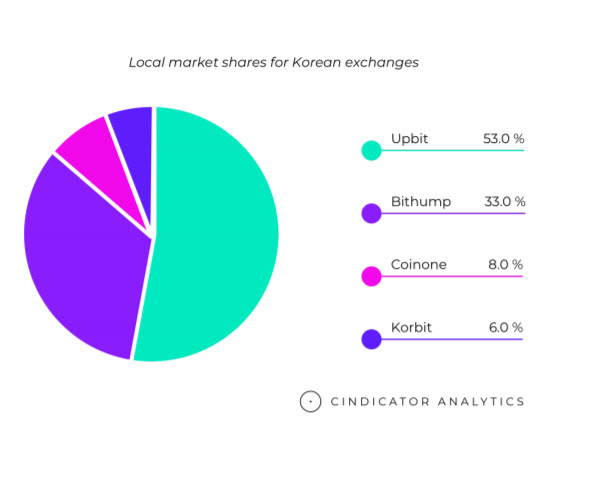As a high-tech hub known for its consumer electronics, tech giants, esports, and global innovation, perhaps it’s not surprising that a report by Cindicator revealed that South Korea will play a major role in cryptocurrency adoption. By reviewing existing data on exchange volumes, recent economic history, regulation, and trends, the tokenized fintech asset management company came to some interesting conclusions.
Based on existing evidence, the country of 50 million inhabitants and one of the world’s top 15 economies is poised to play a major role in embracing cryptocurrencies. This is due to a combination of factors such as exchange infrastructure, a high level of tech adoption, and the country’s regulatory and tax framework.
A Crypto-Friendly Population
When listing the top crypto-friendly countries in the world, rarely does South Korea make the cut. Malta, Singapore, Switzerland, and Estonia are usually more top-of-mind. However, South Koreans with their insatiable appetite for high-tech take the cake in terms of the population’s attitude.
South Koreans, in fact, account for approximately 30 percent of total cryptocurrency trading worldwide, with some 30 percent of all salaried workers owning and trading crypto assets of some kind. Certainly, the country’s recent economic history and growth is a factor, but for a fairly small country, it has a highly developed cryptocurrency exchange scene.
The South Korean Exchange Infrastructure
South Korea has a very developed cryptocurrency exchange scene with Bithumb, the biggest Korean exchange, ranking in the top spot over the last 30 days in terms of trading volume in USD, (data from November 22). There is also Upbit, Coinone, and Korbit. Most of the market is cornered by Bithumb and Upbit (86 percent).
According to the report, there have been plenty of cases in which just the announcement of an altcoin getting listed on either of these exchanges saw its value rise by ridiculous proportions. When tron (TRX) was listed on Bithumb in April 2018, its price went from $0.03 to $0.05 in as little as three hours.
The Cindicator report states:
“There is no doubt that Korean exchanges are a key element in trying to analyze the crypto phenomenon in the Asian.”
Leading Crypto Projects for Mass Adoption
Coinone is working on a blockchain project to make money transfers easier around the globe, while Bithumb also recently announced a payment service in partnership with Qoo10. This company is widely known as the “Asian Amazon.”
There are also plenty of other businesses that are taking blockchain tech to the mainstream, including accelerator projects like Deblock.
Regulation is Coming Around
South Korea was particularly plagued by Ponzi schemes and other sophisticated crypto scams. This, coupled with a large trading volume that caught the attention of regulators, lead them to take an initially strict stance on cryptocurrency. In fact, from September 2017 through March 2018, both ICOs and the anonymous trading of crypto were banned.
These restrictions saw plenty of subsidiaries and projects heading offshore to Singapore to launch ICOs, although the cost of doing this was prohibitive to startups.
Regulation in the country is starting to thaw, however, and appears to have been an initial reaction to address the rampant problems in the ecosystem, such as scam ICOs, and hacks.
The Korean government recently announced 1 trillion won (USD $880 million) to spend on blockchain development in 2019 as part of a 5 trillion won package to stimulate the economy through innovation.
This is a telling indicator that South Korea is changing its stance and creating a more favorable climate for blockchain technology and the legitimization of cryptocurrency.
Taxation
South Korea has a very high taxation rate. However, since 2013, bitcoin and other cryptocurrencies are exempt from capital gains tax. This is significant for traders and investors since they can keep 100 percent of their profits. It also makes navigating crypto taxation much more simple. While there are rumors that this tax haven on crypto may be about to change, no official line has been taken.
Head of Analytics at Cindicator Simon Keusen commented that their research indicates that South Korean influence in the global blockchain industry will continue to increase:
“The country is very open to new technology. The enthusiasm for crypto assets is palpable. Latest legislative initiatives show that the government understands the potential of blockchain technology.”
He concluded that:
“South Korea will play an important role in driving the adoption of cryptocurrencies globally.”
Featured Image from Shutterstock
Get Exclusive Crypto Analysis by Professional Traders and Investors on Hacked.com. Sign up now and get the first month for free. Click here.









